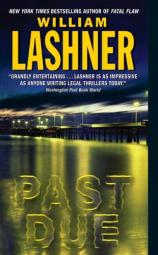Past Due
Review
Past Due
It doesn't take long with PAST DUE --- no it doesn't take long at all, just the first few sentences --- to realize that you're getting into something that transcends the normal reading experience. It's that opening paragraph, where author William Lashner begins comparing a crime scene to a nativity display that tips you off that this will be one of those rare experiences where the boundaries between reader and writer are going to be removed and cut down, and there will be --- dare I say it? --- an intimacy achieved that will be close to making love.
The image that kept recurring to me as I read PAST DUE is that of Lashner as one of those gourmet chefs who comes to your table and prepares this one-of-a-kind meal where everything is perfect. The vegetables are fresh, you can still see the morning dew on them; the meat drips red and is nicely marbled; the sauces and creams shimmer deeply; and the chef knows exactly what he is doing with his razor-sharp cutlery, not so much slicing and dicing as sculpting and carving, his preparation and presentation being as much a part of the meal as the ultimate consumption. Each course is presented in due time, with prescient knowledge of how long it takes to consume, enjoy and digest each presentation. And when the meal is completed, you're not stuffed or bloated, but it was so good that you feel as if you will never need or want to eat again. That was what reading PAST DUE is like.
PAST DUE is the fourth Victor Carl novel. Carl, is a lawyer in Philadelphia as opposed to the archetypal "Philadelphia lawyer." Lashner's presentation of Carl has grown progressively darker with each successive novel; in PAST DUE, he takes a tiny step back from the abyss toward which Carl had seemed to be inexorably headed.
The tale begins with the murder of one of Carl's clients, a multiple-time loser named Joseph Parma, better known as Joey Cheaps. Cheaps had earned his nickname as the result of owing everyone, including Carl, money. As Carl informs us, however, in one of the many brilliant soliloquies that are so bountifully sprinkled throughout this work, Cheaps was his client and thus entitled to his loyalty. Carl accordingly feels duty bound to begin shaking bushes and turning over rocks, doing whatever it takes to discover who murdered Cheaps.
And Carl has a lead, though it's tenuous. Shortly before Cheaps was murdered, he had told Carl a story about a holdup that had gone wrong some 20 years previously and that had resulted in an apparent murder and the loss of a suitcase stuffed with money, a remote event that was coming back to haunt Cheaps and that ultimately snuffed him out entirely. Carl picks up the thread, grudgingly aided by Philadelphia Homicide Detective McDeiss, who is not above trading information for an exquisite meal at a white linen restaurant. The trail leads back to a haunted Pennsylvania Supreme Court Justice, a hedonistic drug dealer, and an enigmatic woman who was the subject, decades before, of a series of erotic photographs, all of whom are tied together in a tableau of passion, guilt and revenge that will have untoward consequences for them all.
Carl has other concerns as well. His father is gravely ill and, while awaiting surgery from which he may not recover, begins to tell Carl a story about a woman from his past, a tale that at first repulses, then fascinates, and ultimately becomes an obsession. Perhaps Lashner will at some future point revisit this father's tale, perhaps not. Certainly it creates a tantalizing starting point for a new novel. And yet PAST DUE is so complete, such a work of art, that one could easily understand if Lashner chose not to return to Carl's universe, at least for a while. What more could he say that is not said between the covers of PAST DUE?
It is of course at this juncture too early to say, but PAST DUE may well be the novel of the year. My sense is that, with this work, Lashner completes the task that Raymond Chandler left undone. If you read nothing else this year, you must read PAST DUE.
Reviewed by Joe Hartlaub on January 24, 2011





